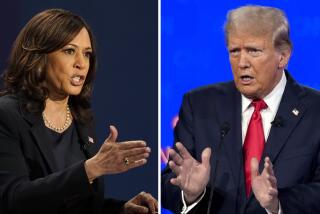Khashoggi, Trump and the press: A president who pretends to hate reporters confronts an ally who really does
The apparent murder of Saudi journalist Jamal Khashoggi coincided, coincidentally, with one of President Trump’s periodic media offensives.
In the two weeks since Khashoggi, a U.S. resident, disappeared, Trump has given almost daily interviews, answering questions from dozens of reporters. That’s not because of the missing journalist, of course, but because the president sees himself as the administration’s best salesperson heading into the midterm elections.
According to a compilation by ABC News, as of Thursday, Trump had answered nearly 300 questions from reporters over an 11-day period. He’s been most prominent on Fox, as Eli Stokols wrote, but the interviews have gone well beyond that. The scope of questioning was a display of openness surpassing any of his recent predecessors.
Simultaneously, however, Trump provided cover for the Saudis after they practiced the ultimate in press censorship, murdering an American-based journalist who had criticized the Saudi government, according to U.S. officials. And, at a rally Thursday night, Trump praised a Republican congressman who pleaded guilty last year to assaulting a reporter.
The juxtapositions say something about Trump — a president who likes to play with authoritarianism — as he deals with a Saudi ally who practices it in deadly earnest.
SOUND A QUAVERING TRUMPET
Since Khashoggi disappeared on Oct. 2, Trump has publicly wavered about what to do.
His administration has tightly embraced Saudi Arabia as an ally, especially in the U.S. confrontation with Iran. Trump watches gasoline prices, knowing that a sudden increase could cause political harm. And his son-in-law and advisor, Jared Kushner, has developed a close relationship with Saudi Crown Prince Mohammed bin Salman, the country’s de facto ruler and the man widely suspected of having targeted Khashoggi.
For days after Khashoggi disappeared, the administration said almost nothing. Then Trump expressed sympathy for Khashoggi’s fiancee, but continued to give credence to Saudi denials that the journalist had been killed.
By Sunday, as Laura King wrote, Trump had shifted ground somewhat, saying in an interview on “60 Minutes” that if the Saudis were involved in anything as “terrible and disgusting” as the murder of a journalist, there would be “severe punishment.”
The next day, as Tracy Wilkinson and Stokols wrote, he wobbled back in the other direction, floating the deeply implausible idea that “rogue killers” might have gotten into the heavily secured Saudi Consulate in Istanbul where Khashoggi was last seen and killed the journalist.
“The king firmly denies any knowledge of it. He didn’t really know. Maybe, I don’t want to get into his mind, but it sounded to me like maybe it could have been rogue killers. Who knows?” Trump told reporters as he recounted a phone call he had with Saudi King Salman.
“We’re going to try to get to the bottom of it very soon, but his was a flat denial,” Trump said. “It sounds like he and also the crown prince had no knowledge.”
On Tuesday, Secretary of State Michael R. Pompeo met with Saudi rulers, and on Wednesday, Trump and Pompeo defended the Saudis.
Trump went so far as to compare the Saudi crown prince to his Supreme Court appointee, Justice Brett M. Kavanaugh, saying that both men had been judged “guilty until proven innocent” — a comparison that might have caused shudders in Kavanaugh’s judicial chambers.
Then, on Thursday, after Pompeo returned to the U.S., the administration abruptly shifted again. Trump acknowledged Khashoggi was probably dead, seemed to accept that Saudis had killed him, and Treasury Secretary Steven T. Mnuchin announced that the U.S. was pulling out of a major international investment conference in Riyadh that most U.S. allies already had abandoned.
The gyrations reflect an administration caught between contending forces, unsure of how to respond, as well as a president who often stubbornly refuses to accept facts that cause him personal or political trouble.
Saudi officials won Trump over early in the administration by playing to his vanity with a lavish welcome when he visited the kingdom. He counts a strengthened relationship with Saudi Arabia as a big win for his administration.
And, of course, Trump loves to talk about all the “things” that he says the Saudis have promised to buy from the U.S., although, as Noah Bierman reported, he uses badly inflated figures to exaggerate the benefits.
At the same time, Republican members of Congress, including Sens. Lindsey Graham of South Carolina and Marco Rubio of Florida, have called for the U.S. to punish the Saudis for what they see as a brazen atrocity. And Trump knows that it’s not hard to convince Americans to see Arab monarchs as villains, having done plenty of that himself.
Administration officials still hope to bring the saga to a close without long-term damage to relations with the Saudis — perhaps with a Saudi statement blaming Khashoggi’s death on an underling. The next couple of weeks will tell if they can pull that off.
DECISION CALIFORNIA — THE MIDTERMS
One major factor as midterm election campaigns wind toward a close — Democrats are out-raising Republicans by millions. Christine Mai-Duc looked at the wave of small-dollar donations swelling Democratic bank accounts in California’s most competitive House races.
The same phenomenon is taking place nationwide — a sign of Democratic anti-Trump fervor and the left’s success in building a vast network of small donors, using the Bernie Sanders model.
As far as voter preferences, in California there’s little suspense at the top of the ticket, Phil Willon reported. Lt. Gov. Gavin Newsom has a commanding lead over John Cox, his Republican challenger, according to the latest USC-Dornsife L.A. Times poll.
In the same poll, the Senate race between Sen. Dianne Feinstein and state Sen. Kevin De León, both Democrats, has more of a twist. De León has run against Feinstein from the left, but much of his support now comes, ironically, from Republicans, Sarah Wire reported. With Democrats outnumbering Republicans in the state, Feinstein still has a big advantage.
De León has had difficulty demonstrating a clear ideological difference between himself and Feinstein, as their debate showed on Wednesday, Wire reported.
Two ballot initiatives — a measure to repeal the recent gas tax increase and one that would expand rent control — both seem headed for defeat, the poll found.
Meanwhile, a major new initiative is headed for the 2020 ballot that would change part of Proposition 13 to allow higher property taxes on commercial buildings, Liam Dillon wrote.
THE TRICKY POLITICS OF INDIAN ANCESTRY
Sen. Elizabeth Warren of Massachusetts, who is planning a presidential run for 2020, fought back this week against Trump’s ”Pocahontas” taunts. As Bierman wrote, she released a DNA test that shows she likely does have some Native American ancestors.
Whether the move helped her politically remains to be seen. Warren got a lot of flak, including from some tribes, but addressing the issue early may yet prove a smart move.
Meanwhile, as Paul Pringle and Adam Elmahrek reported, House Majority Leader Rep. Kevin McCarthy’s family benefited from U.S. program for minorities based on their disputed claim of Native American ancestry. McCarthy’s brother-in-law claims affiliation with the Northern Cherokees — an unrecognized tribe that appears to be widely claimed by people seeking government contracts.
The Bakersfield-area congressman disclaimed any knowledge of his brother-in-law’s business.
DEMOCRAT ON THE MOVE, BUT TO WHAT?
It’s no secret that Rep. Adam Schiff has higher ambitions. Sarah Wire took a look at the question the Burbank Democrat’s colleagues and others keep asking: What’s his next political move?
HEALTHCARE DOMINATES CAMPAIGNS, RUSSIA NOT
GOP lawmakers who voted for years to repeal Obamacare now say they want to save popular parts of it, Jennifer Haberkorn reported. In campaigns around the country, Republicans now claim that they support protections for people with preexisting health conditions, even though their voting record points in the opposite direction.
Healthcare has dominated campaigns back to 2010, but this year, it’s the Democrats who are on offense on the issue.
By contrast, few Democrats focus on the Russia investigation, Chris Megerian wrote. He looked at why the Democrats don’t press the issue more.
Republicans had hoped the campaign would turn on the good economy, but as Mark Barabak wrote from Nevada, Trump’s unpopularity in many parts of the country outweighs the low unemployment rate.
Men have done it since the Founding Fathers. Now female veterans are hoping to parlay military service into political careers, Haberkorn wrote, looking at the large crop of female vets running in both parties.
AS GOP TRIES TO REACH WOMEN VOTERS, TRUMP ATTACKS ‘HORSEFACE’
A federal judge on Monday dismissed Stormy Daniels’ defamation suit against Trump. As Michael Finnegan wrote, the judge ruled that the 1st Amendment protected Trump’s comments about the porn actress, whom he paid off after she claimed a sexual encounter with him.
Trump’s twitter jibes at Daniels, were in the realm of “rhetorical hyperbole” that the 1st Amendment covers, the judge wrote, and he ordered her to pay the president’s legal fees.
The defamation suit was only one part of the litigation surrounding Trump’s alleged affair with Daniels, whose real name is Stephanie Clifford. Trump, however, claimed total victory and labeled Daniels “Horseface.”
That’s probably not what Republican campaign strategists were hoping for in an election in which they’re trying to improve the party’s image among women.
MATTIS COMING OR GOING?
In his 60 Minutes interview on Sunday, Trump applied a different label to Secretary of Defense James N. Mattis, calling him “sort of a Democrat” — not a compliment from Trump — and musing about whether he might leave after the midterm election.
The next day, however, Mattis told reporters that Trump gave him vote of confidence in a telephone call.
“He said, ‘I’m with you 100%,’” Mattis told reporters traveling with him to Asia.
The exchanges were the latest example of how Trump likes to publicly toy with senior officials.
DRUGS FROM CHINA
The main item on the agenda for Mattis’ trip was an effort by U.S. and Chinese officials to try to reset relations after months of growing tensions, both militarily and economically. Mattis’ aides conceded that the talks made little progress, David Cloud reported from the scene.
Another big issue in the U.S.-China relationship: Fentanyl smuggled from China is killing thousands of Americans, Del Wilber reported, looking at major cases across the country. The Chinese have promised to crack down on illegal operations that manufacture and ship synthetic opioids. U.S. officials say they’ve seen little progress.
LOGISTICS
That wraps up this week. Until next time, keep track of all the developments in national politics and the Trump administration with our Essential Washington blog, at our Politics page and on Twitter @latimespolitics.
Send your comments, suggestions and news tips to politics@latimes.com.
If you like this newsletter, tell your friends to sign up.
More to Read
Get the L.A. Times Politics newsletter
Deeply reported insights into legislation, politics and policy from Sacramento, Washington and beyond. In your inbox three times per week.
You may occasionally receive promotional content from the Los Angeles Times.











